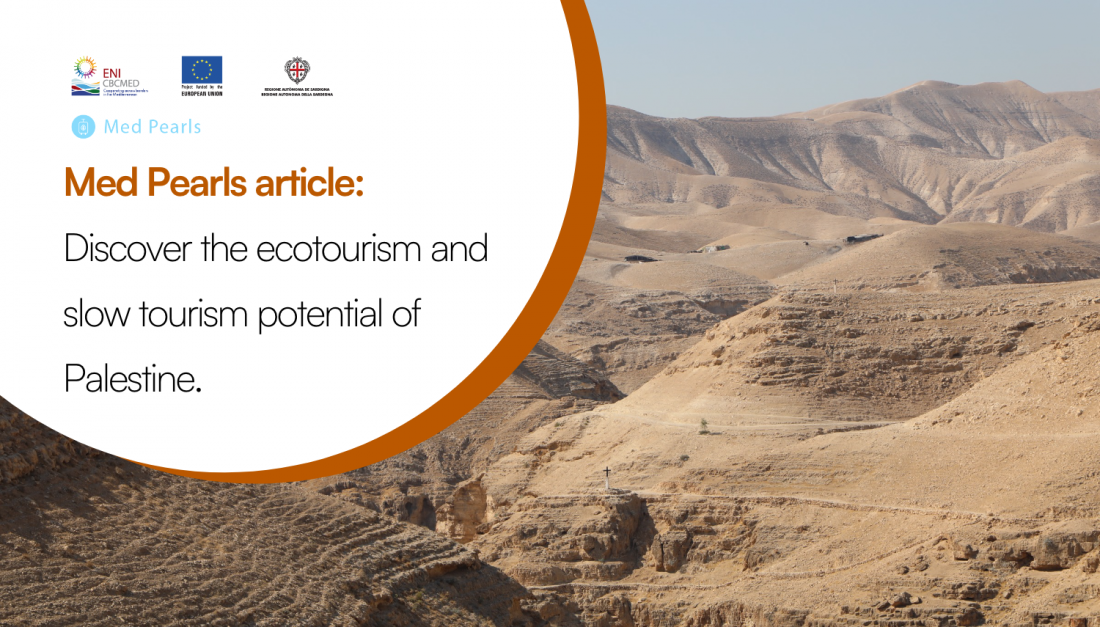The potential of ecotourism in Palestine. A Med Pearls article on the benefits of sustainable tourism practices.

A sacred home to the world's great religions, Palestine is a unique destination for both its culture, history and nature, as it is a natural habitat for many of the world's most amazing, rare and endangered species of birds, mammals and plants. Filled with ancient religious and archaeological sites, the high desert environments of Palestine are harsh, yet beautiful, for human and animal families alike. The fertile Jordan Valley, the birthplace of agriculture in the Middle East, is home to unique and fragile wildlife and ecosystems, that provides the region with a strong potential to become a solid tourist base for both domestic and international travellers. For these and other reasons, in this article we will find out more about this ancient land as well as discover why it has been focusing for some time now in the promotion of slow tourism and ecotourism.
The wonders of Palestine:
To start with, Palestine has a rich diversity of geography and climates influenced by the Mediterranean Sea, the long shoreline of Gaza, the Jerusalem Mountains and the Rift Valley. In a small area, the biodiversity is truly astounding: with 2,850 plant species and over 555 birds that inhabit or migrate across this compact ecoregion. For example, many bird species travel all the way from Europe to Africa via small land bridges in southern and central Palestine. In addition, more than 80 species of mammals and thousands of insects, reptiles, and other amphibians also inhabit this compact and diverse stretch of land.
Apart from its natural heritage, Palestine also has interesting cities to discover. For instance Bethlehem and Jerusalem are a holy site for many religions, with sites such as the Church of the Holy Sepulcher, Al-Aqsa Mosque, and the Church of the Nativity. Furthermore, many visitors are amazed to discover that Jericho, the oldest city in the world that began regulating the cultivation of wheat nearly 10,000 years ago, and Nablus, on the famous Mount Gersim and inhabited by the Samaritans, are still lively places that can be visited. Or, let's not forget about the long, slender land of Gaza and its famous valley surrounded by the Mediterranean Sea. On a clear day, from the splendid mountains of Jerusalem, tourists and residents alike are able to enjoy the views from this location to the Jordan Mountains across a valley view that is only slightly different from biblical times.
Ecotourism in Palestine:
For Palestine, ecotourism today shows a big interest for the environment and nature. In this one, visitors not only want to see and understand the tourist sites, but they want to learn about their ecosystem, habitat, and the nature that supports the natural and heritage places. Furthermore, in this kind of tourism, local community members are also proud to show off their heritage and are willing to help in the promotion to visitors to keep places clean and green. In turn, ecotourism activity helps in providing for and improving the quality of life of Palestinian destinations.
For these reasons, the new ecotourism concept includes all the necessary steps to support their activities such as production and marketing of slow tourism programs that cover the cultural, heritage, natural and environmental resources of the country. Thus, tourists can come and enjoy themselves in these places where they can visit the natural sites and spend long periods of time that may lead them to get to know closely the life of the Palestinian people, their culture and nature, and even watch the birds while interacting with the indigenous people. Furthermore, they can also join the ancient festivals, national and religious during the year that have existed for thousands of years.
About PWS:
The Palestine Wildlife Society was established in 1999 and deals with the preservation of species, nature and culture in Palestine (chiefly nature conservation and environmental education). Currently, it also manages ecotourism programs, which used to be called "field trips" to nature and archaeological sites.
The beginning of such activity was a few years ago when they started to introduce tourism concepts in cooperation with the Ministry of Tourism and other institutions in the Bethlehem and Jericho regions, that were funded by the Global Environment Facility "GEF-SGP" in Ramallah. Their goal at the time was to help school teachers and provide local tourism aids to train tourism colleges and girl guides in Bethlehem through environmental education workshops and conferences at schools and universities.
Now, PWS also works as a Partner of the Med Pearls project. Which thanks to the EU funding of the ENICBC MED programme is introducing the concept of Slow Tourism in the territory by helping in the creation of slow tourism products in the regions of Jenin and Bethlehem. An exciting opportunity that matches greatly the existing eco tourism offer, and that it is also helping the economic promotion of its ICT sector.









